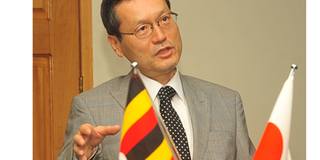Gays law: Japan won’t abandon Uganda

Mr Junzo Fujita at a press conference in Kampala. Photo by Stephen Wandera
What you need to know:
Japanese ambassador says the legislation and the need to help the suffering people are two different things altogether.
KAMPALA- Just days after President Museveni signed the anti-gay legislation into law, the Japanese Ambassador to Uganda, Mr Junzo Fujita, said his government will not abandon Ugandans even as some donor countries threaten to withdraw aid.
Speaking after signing an agreement that will see communities in eastern and northern Uganda access a grant totalling to $203,183 (nearly Shs490m) through the Grant Assistance for Grassroots Projects (GGP) scheme, Mr Fujita said what matters is helping people in need and not the legislation.
Two different things
“This issue (anti-gay law) and aid are different. In my own view, people are affected and they need safe water. We cannot close our eyes because of that issue (anti-gay legislation),” he added.
According to Mr Fujita, Japanese understanding of homosexuality is a little different from other donor countries like the US and UK. He was of the view that each country develops through some stage, and it is something that happens naturally.
However, he admitted that the signing of the legislation into law by the President earlier in the week has prompted agitation in the donor community.
“We are struggling with that issue together with other donor countries.
“But we are also consulting with our home government about it—whether to side with other donor countries or not.”
He argued that like all other responsible countries, Uganda is bound to respect international conventions on human rights which it appended its signature to.
Among the beneficiaries of the grant is the Pentecostal Assemblies of God based in Soroti. The project will construct 12 bore holes in order to improve access to safe water for over 17,000 people in Soroti District.
The average rate of access to safe water remains low at only 58 per cent in Arapai, Gweri, Kamuda and Tubur sub-counties where the project will take place.
Women, children to benefit
Particularly, women and children bear a heavy burden of collecting safe water, and many of them suffer from water-borne diseases such as diarrhea and typhoid since they have to fetch unsafe drinking water from nearby springs.
The other recipient of the grant, Kole and Oyam districts had been affected by 20 years of armed conflicts, and social services remain dysfunctional.
Although the resettlement of internally displaced persons started in 2006, many people have no access to safe water in the districts.
Through Christian Vision International, the project will construct 13 bore holes which will provide access to safe water for 13,415 people.



